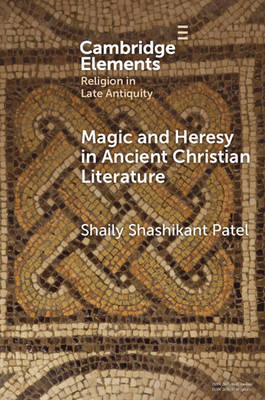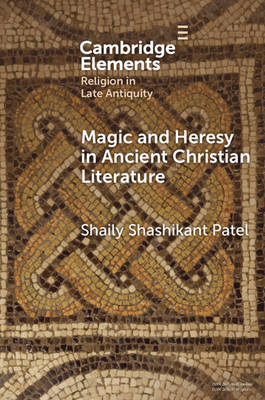
Bedankt voor het vertrouwen het afgelopen jaar! Om jou te bedanken bieden we GRATIS verzending (in België) aan op alles gedurende de hele maand januari.
- Afhalen na 1 uur in een winkel met voorraad
- In januari gratis thuislevering in België
- Ruim aanbod met 7 miljoen producten
Bedankt voor het vertrouwen het afgelopen jaar! Om jou te bedanken bieden we GRATIS verzending (in België) aan op alles gedurende de hele maand januari.
- Afhalen na 1 uur in een winkel met voorraad
- In januari gratis thuislevering in België
- Ruim aanbod met 7 miljoen producten
Zoeken
Magic and Heresy in Ancient Christian Literature
Shaily Shashikant Patel
€ 24,45
+ 48 punten
Uitvoering
Omschrijving
Magic and Heresy in Ancient Christian Literature is a genealogical study of two parallel but not coequal discursive trajectories: of 'magic' and of 'heresy.' This longue durée analysis charts how these two discursive streams intersect in myriad ways, for myriad ends, across the first four centuries of selected Christian literature. Magic and Heresy attempts to answer in part the question: When and how did early Christian authors start thinking of magic as heresy - that is, as a religious and epistemic system wholly external to their own orthodoxies? Prompted by metacritical concerns about the relationship between magic and heresy, as well as these categories' roles in erecting and maintaining Christian empire, this Element seeks to disrupt tidy conceptual conflations of magic-heresy constructed by ancient authors and replicated in some modern scholarship. Magic and Heresy excavates the cycles of discursive disciplining that eventually resulted in these very conflations.
Specificaties
Betrokkenen
- Auteur(s):
- Uitgeverij:
Inhoud
- Aantal bladzijden:
- 78
- Taal:
- Engels
- Reeks:
Eigenschappen
- Productcode (EAN):
- 9781009331661
- Verschijningsdatum:
- 7/08/2025
- Uitvoering:
- Paperback
- Formaat:
- Trade paperback (VS)
- Afmetingen:
- 152 mm x 229 mm
- Gewicht:
- 117 g

Alleen bij Standaard Boekhandel
+ 48 punten op je klantenkaart van Standaard Boekhandel
Beoordelingen
We publiceren alleen reviews die voldoen aan de voorwaarden voor reviews. Bekijk onze voorwaarden voor reviews.









